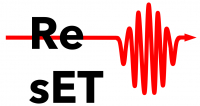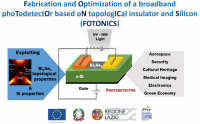
Daniele Catone -
Patrick O’Keeffe -
Alessandra Paladini -
Francesco Toschi -
Stefano Turchini -
Faustino Martelli (CNR-IMM) -
Research Activities
EuroFEL Support Laboratory is an ultrafast laser laboratory situated in the headquarters of the Istituto di Struttura della Materia of the National Research Council. It concentrates on the use of pump-probe techniques to study ultrafast processes in nanostructured, plasmonic, and photovoltaic materials, as well as in molecules. The mission of the laboratory is to build up an ultrafast spectroscopy community in Italy to support activities at Free Electron Laser facilities both in Italy and abroad. To do so the lab is open to research proposals for the study of ultrafast photoinduced processes in materials.
Plasmonics
Plasmonic nanoparticles exhibit a strong interaction with light through the localized surface plasmon resonance (LSPR). This occurs when the oscillations of the conduction electrons in the plasmonic material enter into resonance with the incident light field. This has a number of fascinating consequences for light matter interaction including extremely strong light absorption and scattering and concentration of the electric field into “hot spots” (see figure where hots spots form at the tips of the plasmonic ellipsoids). The EFSL activity aims to study the ultrafast dynamics which occur following the interaction of the light with various plasmonic nanostructures such as gold nanospheres in liquids, arrays of 2D nanoparticles on transparent substrates, nanoparticle deposited on semiconductor nanowires. The EFSL is principally active in the field of:
- Hot electron generation in metallic nanostructures solution
- Energy transfer from plasmonic nanostructures to wide band gap semiconductors
- Thermoplasmonics
- Morphological control of nanostructure through localized heating
Photovoltaics
The ultrafast carrier dynamics in hybrid halide perovskite and bulk heterojunction photovoltaic cells is still far from being completely understood, even though it is known that their e?cient collection may increase the power conversion efficiency of the cells. The ultrafast transient absorbance and fluorescence up-conversion spectroscopies are unique tools for the characterization of the ultrafast carrier dynamics such as thermalisation and cooling which occur on the femtosecond timescale. In this way the fate of the carriers formed after photoexcitation and the transfer process from the photoabsorbing layer to the electron and hole transfer layers can be studied. A deeper fundamental understanding of the ultrafast carrier dynamics will facilitate the improvement of the conversion efficiency in the perovskite-based solar cells. The EFSL is principally active in the field of:
- Ultrafast carrier dynamics in perovskite-based solar cells
- Hot-carrier generation and thermalization
- Charge transfer in bulk heterojunction photovoltaic cells
The EFSL performs these studies thanks to the collaboration with the University of Tor Vergata and CHOSE.
Nanomaterials
The carrier dynamics of semiconductors depend in part on the morphology of the samples. The study of these materials using ultrafast transient absorbance spectroscopy and cryogenic photoluminescence provides important details on the ultrafast carrier dynamics and on effects that take place on the femtosecond/picosecond time scale such as band gap renormalization. The EFSL is principally active in the field of:
- ltrafast carrier dynamics, semiconductor nanostructure
- Energy transfer processes between semiconductor nanowires and plasmonic nanostructures
- Photoluminescence dynamics in semiconductors.
The EFSL performs these studies thanks to the collaboration with the Institute for Microelectronics and Microsystems (IMM).
Molecular Dynamics
Photoexciting molecular systems with a femtosecond laser pulse and then following the spectral changes in the absorption or emission of the photoexcited states allows us to follow ultrafast electronic and structural changes as the molecule relaxes back to its ground state. In this way, important information on structural dynamics, long range interactions, charge transfer processes in molecules, macromolecules and clusters, can be obtained. The EFSL is principally active in the field of:
- Ultrafast processes in organic molecules in solution
- Excited state decay in transition metal complexes
Instrumentation
The laboratory is equipped with an amplified Ti:Sa laser system (800 nm, 35 fs, 4 mJ) couped to an Optical Parametric Amplifier (OPA), which allows it to produce sub 40 fs laser pulses in the wavelength range from 240 to 20000 nm. A number of different set-ups are available in EFSL:
- Femtosecond Transient absorbance Spectroscopy (FTAS) FemtoFrame-II (IB Photonics)
- Fluorescence up-conversion spectrometer Halcyone (Ultrafast Systems)
- Pump-probe set-up with single probe wavelengths Tabletop
- Time-resolved Photoluminescence Photoluminescence
- Apparatus for the generation of high-harmonics (HHG) HHG

 ResET is a 2-year long project funded by the European Union - Next Generation EU through the PRIN PNRR2022 grant scheme.
ResET is a 2-year long project funded by the European Union - Next Generation EU through the PRIN PNRR2022 grant scheme. ELDORADO is a project funded by the Italian Ministry of Education, Universities, and Research (MUR) under the PRIN 2022 call.
ELDORADO is a project funded by the Italian Ministry of Education, Universities, and Research (MUR) under the PRIN 2022 call. NFFA-DI is the NFFA upgrade proposal for realizing a Full-Spectrum Research Infrastructure for nanoscience and nanotechnology, capable of enhancing the
NFFA-DI is the NFFA upgrade proposal for realizing a Full-Spectrum Research Infrastructure for nanoscience and nanotechnology, capable of enhancing the The new Special Issue entitled "Photoinduced Ultrafast Dynamics in Nanocomposite Materials" published by the journal Nanomaterials (ISSN 2079-4991, IF 5.719)
The new Special Issue entitled "Photoinduced Ultrafast Dynamics in Nanocomposite Materials" published by the journal Nanomaterials (ISSN 2079-4991, IF 5.719) The EFSL research group, in collaboration with the Laboratoire Lumière, Matière et Interfaces and the Laboratoire de Physique des Solides
The EFSL research group, in collaboration with the Laboratoire Lumière, Matière et Interfaces and the Laboratoire de Physique des Solides A good start to 2022 for the EFSL lab: we are officially part of the NFFA European network! #NFFAeu #infrastructure
A good start to 2022 for the EFSL lab: we are officially part of the NFFA European network! #NFFAeu #infrastructure The #FOTONICS project aims to realize and optimize a photodetector based on the ultra-fast Bi2Se3/Si heterojunction, operating at low voltage
The #FOTONICS project aims to realize and optimize a photodetector based on the ultra-fast Bi2Se3/Si heterojunction, operating at low voltage English (UK)
English (UK)  Italiano (Italia)
Italiano (Italia)